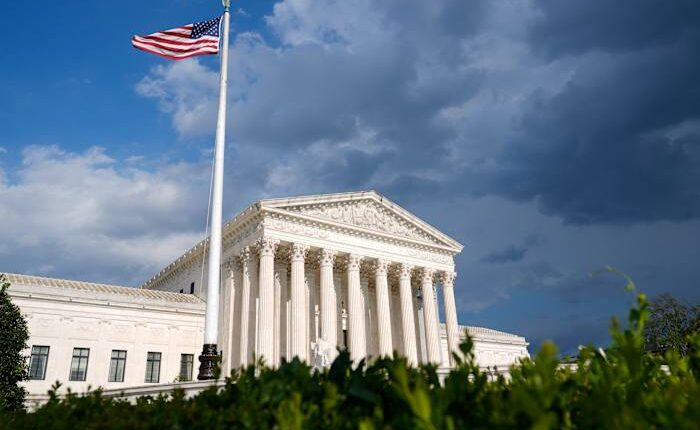Share this @internewscast.com

WASHINGTON – The Supreme Court is set to review its newest case concerning LGBTQ+ rights on Tuesday, focusing on the legal standing of prohibitions enacted by almost half of the U.S. states against a practice called conversion therapy for minors.
A Christian counselor has brought forth a lawsuit against a Colorado statute that forbids therapy intended to alter sexual orientation or gender identity. Kaley Chiles, with the backing of former President Donald Trump’s administration, contends that this law infringes upon her right to free speech by preventing her from providing voluntary, faith-based therapy to children.
Conversely, Colorado maintains that the law governs licensed therapists by disallowing a practice that has been scientifically debunked and associated with significant harm.
The deliberations take place several months after the Supreme Court’s conservative majority ruled that states can prohibit transition-related healthcare for transgender young people, marking a setback for LGBTQ rights. The Court is also anticipated to tackle a case involving transgender athletes’ participation in sports this session.
State says therapy is health care and subject to regulation
Since its enactment in 2019, Colorado has not prosecuted anyone under this law, which exempts religious organizations. State lawyers argue that it still permits any therapist to engage in broad, faith-centered dialogues with minors concerning gender and sexuality.
“The sole restriction the law imposes on therapists is to prevent a treatment that seeks a predetermined result of altering a minor’s sexual orientation or gender identity, as such treatment is both unsafe and ineffective,” asserted the attorneys from Colorado.
Therapy isn’t just speech, they said — it’s health care that governments have a responsibility to regulate. Violating the law carries potential fines of $5,000 and license suspension or even revocation.
Linda Robertson is a Christian mom of four from Washington state whose son Ryan underwent therapy that promised to change his sexual orientation after he came out to her at age 12. The techniques led him to blame himself when it didn’t work, leaving him ashamed and depressed. He died in 2009, after multiple suicide attempts and a drug overdose at age 20.
“What happened in conversion therapy, it devastated Ryan’s bond with me and my husband,” she said. “And it absolutely destroyed his confidence he could ever be loved or accepted by God.”
Chiles contends her approach is different from the kind of conversion therapy once associated with practices like shock therapy decades ago. She said she believes “people flourish when they live consistently with God’s design, including their biological sex,” and she argues evidence of harm from her approach is lacking.
Chiles says Colorado is discriminating because it allows counselors to affirm minors coming out as gay or identifying as transgender but bans counseling like hers for young patients who may want to change their behavior or feelings. “We’re not saying this counseling should be mandatory, but if someone wants the counseling they should be able to get it,” said one of her attorneys, Jonathan Scruggs.
The Trump administration said there are First Amendment issues with Colorado’s law that should make the law subject to a higher legal standard that few measures pass.
Similar laws also face court challenges
Chiles is represented by Alliance Defending Freedom, a conservative legal organization that has appeared frequently at the court in recent years. The group also represented a Christian website designer who doesn’t want to work with same-sex couples and successfully challenged a Colorado anti-discrimination law in 2023.
The group’s argument in the conversion therapy case also builds on another victory from 2018: A Supreme Court decision found California could not force state-licensed anti-abortion crisis pregnancy centers to provide information about abortion. Chiles should also be free from that kind of state regulation, the group argued.
Still, the Supreme Court has also found that regulations that only “incidentally” burden speech are permissible, and the state argues that striking down its law against conversion therapy would undercut states’ ability to regulate discredited health care of all kids.
The high court agreed to hear the case after the 10th U.S. Circuit Court of Appeals in Denver upheld the law. Another appeals court, the 11th U.S. Circuit Court of Appeals in Atlanta, has struck down similar bans in Florida.
Legal wrangling has continued elsewhere as well. In Wisconsin, the state’s highest court recently cleared the way for the state to enforce its ban. Virginia officials, by contrast, have agreed to scale back the enforcement of its law as part of an agreement with a faith-based conservative group that sued.
___
Follow the AP’s coverage of the U.S. Supreme Court at https://apnews.com/hub/us-supreme-court.
Copyright 2025 The Associated Press. All rights reserved. This material may not be published, broadcast, rewritten or redistributed without permission.












